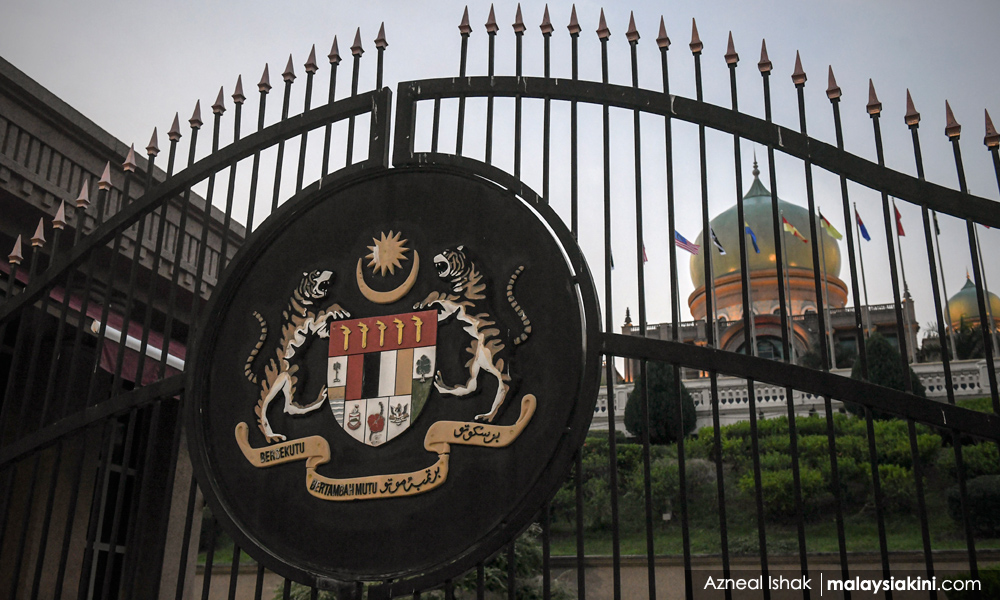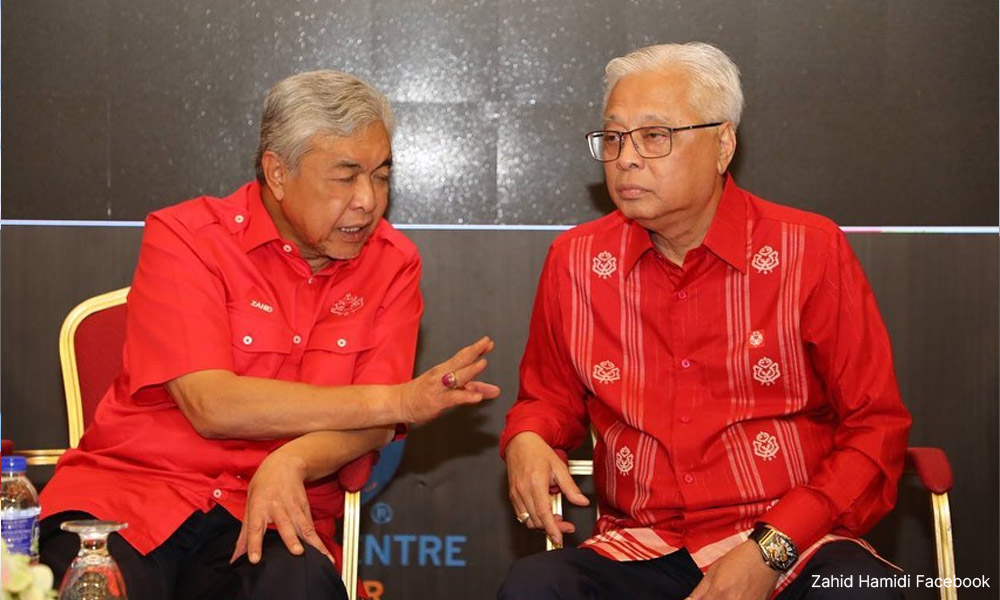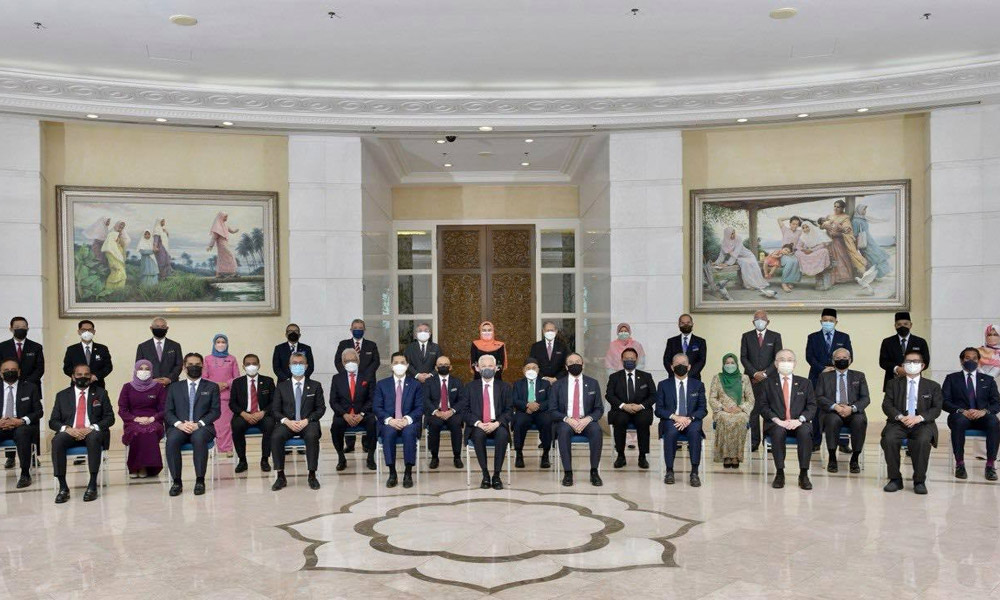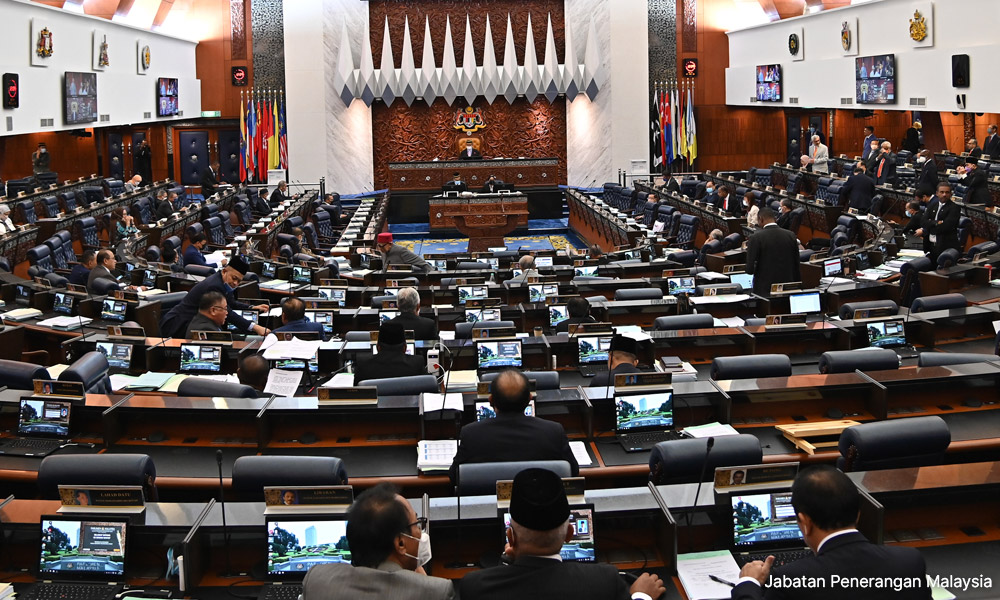Because our Federal Constitution was drafted initially without recognising political parties, Article 43(2)(a) of the Federal Constitution treats the formation of the government as if it is a business of individual parliamentarians.
It reads, “the Yang di-Pertuan Agong shall first appoint as Prime Minister to preside over the cabinet a member of the House of Representatives who in his judgment is likely to command the confidence of the majority of the members of that House.”
A literal interpretation of Article 43(2)(a) results in races in the collection of statutory declarations (SDs) between prime ministerial aspirants, who would then rush to the gate of the Palace to show their numbers.
Because of such ugly scenes, this method is widely discredited by Malaysians. Of course, it does not produce stable and lasting governments. If it worked, then the Muhyiddin Yassin government established by the SDs of allegedly 113 MPs on March 1, 2020, should have lasted its full term or would have dissolved the last Parliament.
The standard practice of parliamentary democracies in general requires the political parties to engage in government formation negotiation in the event of a hung Parliament, with a minimum role of the head of state.
Why? Parliamentary governments are party-based. Coalition governments require the allying parties to get along with each other during their cohabitation. They need to sort out the rules on their goals – what to do and what not to do – and their decision-making mechanism on undecided or new issues.
Quick match-making cannot guarantee peace after the honeymoon period.
Duration, not speed in govt formation
If we want political, economic, and social stability, then the primary criterion of success in government formation should be duration, not speed.
Not just citizens, investors – both international and domestic – expect the next government to be functional, competent, and lasting, and if there has to be any mid-term change, the transition would be orderly and produce a better outcome.

Failing this, our economy will pay a heavy price in the looming global recession when conflicts within government or between the government and the opposition distract us from managing the crises awaiting us – not just economic, but also in environment and healthcare.
There is rightly no deadline stipulated for government formation in the Federal Constitution, and also no merit to impose a rigid timeline.
‘Alliance of MPs’, not government of parties
Perhaps no one knows better the peril of this “Government by SDs” method than Umno.
Two days after Muhyiddin Yassin formed his cabinet on March 10, 2020, Umno vice-president Mohd Khaled Nordin posted on his Facebook that the “unanimous” position of “all who spoke” in the Umno supreme council and political bureau meetings was that “The [Muhyiddin] government that exists is only an alliance of MPs and not cooperation between parties.” (Kerajaan yang ada hanyalah perikatan antara Ahli-Ahli Parlimen dan bukan kerjasama antara parti-parti.)
This discontent was directed at the government formation process, where Muhyiddin picked his cabinet members from Umno without consulting the party’s leadership.
The split continued after Ismail Sabri Yaakob took over, with two factions emerging in Umno - Umno in Putrajaya (government) and Umno in WTCKL (party headquarters).

Instead of having 30 BN parliamentarians making 30 individual choices, it is better for BN to stay as a bloc to negotiate with other blocs on whether they support Pakatan Harapan or PN.
At this stage of our democratisation, our party system needs more consolidation (and intra-party democratisation), not more fragmentation.
“Government by SDs” will, unfortunately, contribute to the latter and it goes against the spirit of the Anti-Hopping Law passed unanimously by Parliament in July.
Tests awaiting the next government
The next federal government would need to pass at least four tests due to scheduled political events. They are as listed below.
1. The vote on the provisional financial bill before the year 2022 ends in order to allow the government to operate before Budget 2023 is passed.
2. The vote on Budget 2023 next year.
3. The implications of internal Umno elections, which are to be held by May 19, 2023, the latest, if the party is part of the coalition government.
4. Mid-term elections in six states under Harapan and Perikatan Nasional (PN), due by Aug 23 to Sept 30 (if the outcomes or dynamics somehow affect the coherence of the coalition government).
The government’s response to possible crises may also be tested, whether it is the continuously falling value of the ringgit, food shortage, flash floods, or another pandemic.
Governments have the potential to arise gloriously for successfully managing crises, like New Zealand’s government under Prime Minister Jacinda Ardern, which went on to a second term with majority under a mixed-member proportional (MMP) electoral system.
More often than not, governments fall after the mismanagement of crises, even when it is a single-party government like the government of UK’s Liz Truss.
Coalition governments are particularly susceptible to internal clashes between partners. If it is a PN-BN-GPS-GRS government, the trigger could be a clash between PAS and the Borneo parties, or the renewed bitter rivalry between Umno, PAS, and Bersatu that characterised the 32 months after the Sheraton Move.

Likewise, a Harapan-BN government may be trapped by old scores between parties in the two coalitions.
At that time, what is the point of the SDs collected and flaunted today? Don’t we have enough of the post-Sheraton chaos?
Power-sharing through Parliament
Many Malaysians have expressed support for a grand coalition government (so-called “unity government”) which includes Harapan, PN, and the Borneo parties.
Such a government, however, may be bloated (to include representatives from all parties), be free from rigorous check and balance (as there might be little or no opposition MPs left), and worse, dysfunctional because of the deep distrust and enmity between government partners and ministers.
A better arrangement is power-sharing through Parliament, whereby:
1. One of the two blocs leads the government while the other leads the shadow cabinet with commensurate salary, resources, and information access for the shadow ministers.
2. The smaller blocs and parties can choose to be the government’s junior partner, confidence-and-supply agreement (CSA) partner on the opposition bench, or full opposition.
3. Harapan or PN gets to form government depending on who can assemble a majority by getting BN and the Borneo parties to be their junior partner or CSA partner.
This would resolve the deadlock as Harapan and PN would have to negotiate with the smaller blocs, especially BN, without whom no majority may be reached.
But, whoever wins, the other side does not lose entirely. Below can be the package deal that ensures inclusion, competition, and accountability.
1. The entire government front bench cannot exceed 25 percent of the Dewan Rakyat, 55 ministers and deputy ministers in total (27 ministries at the maximum).
2. Shadow ministers, one per ministry with no deputy, would be paid half the ministerial salary and provided policy staff but no other perks.
3. Each ministry is also to be scrutinised by a parliamentary select committee, consisting of both government and opposition backbenchers, and supported by policy staff.
4. Every government and opposition backbencher gets to sit in at least one parliamentary select committee, and each committee chair and deputy chair would be paid a fraction of ministerial salary less than that of the shadow minister’s.

This means every ministry will have one minister, one deputy minister, one shadow minister, one chair, and one vice-chair for the corresponding parliamentary select committee, but the last three are tasked to scrutinise the first two and paid much less.
For the maximum of 27 ministries, we would have a total of 135 persons tasked with ministerial affairs, but 54 in government, 27 in the shadow cabinet, and 54 in multi-partisan parliamentary committees.
Instead of a bloated administration that one would expect of a Malaysian grand coalition, we would have a slim administration, a well-equipped shadow cabinet, and a vibrant Parliament.
Malaysians deserve political stability, accountability
We were put to vote in the monsoon season for an impossible task of resolving a hung Parliament and a proud 74 percent of us turned up to vote.
Now, our Parliament is more hung than before. We deserve a solution, not a repetition of the post-Sheraton instability by way of collecting and flaunting SDs.
We deserve a functional government and accountable parties. The institutions that got us to vote in floods owe us that.
Let’s throw away all SDs and start by getting the parties to negotiate a government and parliamentary power-sharing deal. - Mkini
WONG CHIN HUAT is Deputy Head (Strategy), Asia Headquarters of the UN Sustainable Development Solutions Network (UN SDSN), at Sunway University. This Essex-trained political scientist works political institutions and group conflicts. Mindful of humans’ self-interest motivation while pursuing a better world, he is a principled opportunist.
The views expressed here are those of the author/contributor and do not necessarily represent the views of MMKtT.




No comments:
Post a Comment
Note: Only a member of this blog may post a comment.